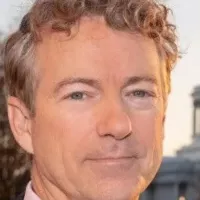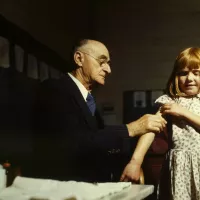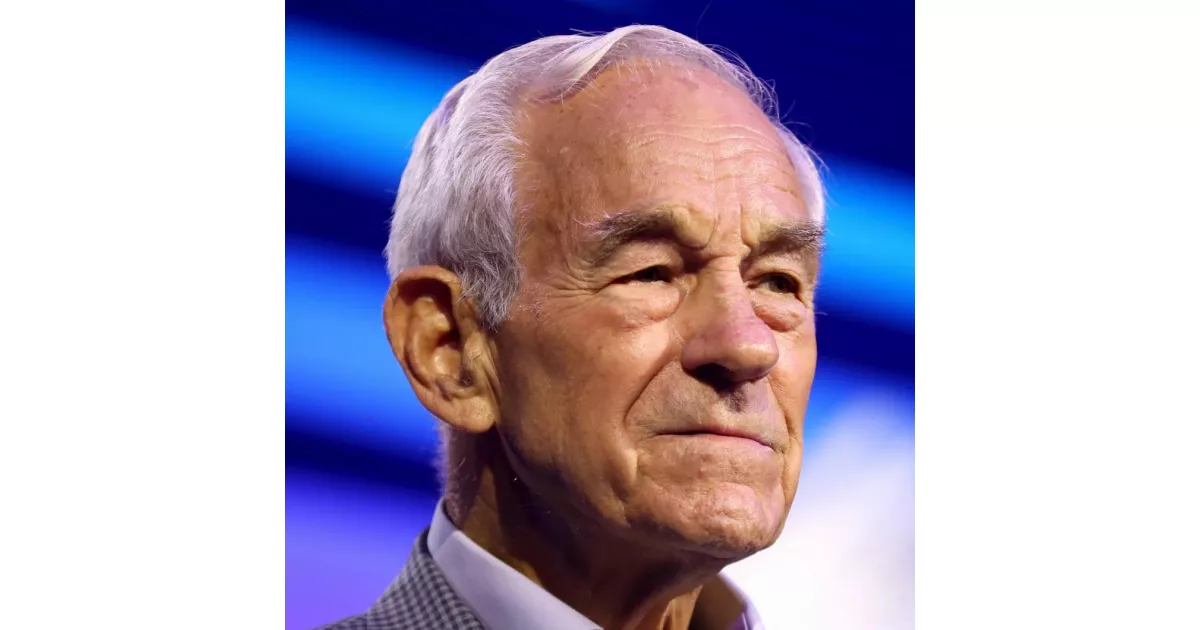"Ronald Ernest Paul is a retired American politician, physician, and author. He served as a U.S. Representative for Texas from 1976 to 1985 and again from 1997 to 2013. Paul is a three-time presidential candidate, running as the Libertarian Party nominee in 1988 and as a Republican in 2008 and 2012. He is known for his libertarian political views, advocating for limited government, individual liberty, and a non-interventionist foreign policy."
1904: Birth of Howard Caspar Paul
Ron Paul's father, Howard Caspar Paul, was born.
1908: Birth of Margaret Paul
Ron Paul's mother, Margaret Paul, was born.
1933: End of the Gold Standard
The United States ended the gold standard, which Ron Paul later advocated for returning to.
August 20, 1935: Ron Paul's Birth
On August 20, 1935, Ronald Ernest Paul was born in Pittsburgh to Howard Caspar Paul and Margaret Paul.
1937: Congressional Voting Record Analysis Begins
A study period commences to analyze congressional voting records, starting in 1937 and spanning several decades, to assess the political leanings of U.S. Representatives.
1952: Ron Paul Meets Future Wife, Carol Wells
Ron Paul first met Carol Wells in 1952 when she asked him to escort her to her 16th birthday party.
1956: Vote for Dwight D. Eisenhower
In 1956, at the age of 21, Ron Paul voted for Dwight D. Eisenhower for president, marking the beginning of his lifelong support for the Republican Party.
1957: Ron Paul Marries Carol Wells
Ron Paul and Carol Wells were married in 1957.
1957: Graduation from Gettysburg College
Ron Paul graduated from Gettysburg College with a B.S. degree in Biology.
1961: Medical Degree from Duke University
Ron Paul earned his Doctor of Medicine degree from Duke University's School of Medicine.
1963: Air Force Flight Surgeon
Ron Paul began his service as a flight surgeon in the U.S. Air Force.
1963: Start of Air Force Service
Ron Paul began serving as a flight surgeon in the United States Air Force.
1964: Ron Paul Critiques the Civil Rights Act
Ron Paul expresses his criticism of the Civil Rights Act of 1964, arguing that it increased federal interference in the labor market and failed to achieve its intended goals of racial harmony and a color-blind society.
1965: Transition to Air National Guard
Ron Paul transitioned from the Air Force to the Air National Guard, continuing his service as a flight surgeon.
1968: Relocation to Texas
After completing his service with the Air National Guard, Ron Paul and his wife moved to Texas, where he started a private practice in obstetrics and gynecology.
1968: End of Air Force Service
Ron Paul completed his service as a flight surgeon in the U.S. Air Force and Air National Guard.
August 15, 1971: Nixon Ends Gold Standard
President Richard Nixon ended American participation in the Bretton Woods System, effectively ending the U.S. dollar's direct convertibility to gold. This event motivated Ron Paul to enter politics.
1972: Henry Grover's Gubernatorial Run
Henry Grover, a candidate in the 1984 senatorial primary alongside Ron Paul, lost the 1972 Texas gubernatorial election to Dolph Briscoe, Jr.
1972: John Hospers Receives Electoral Vote
John Hospers, the first registered Libertarian presidential candidate, received an electoral vote in the 1972 presidential election.
1974: Defeat by Robert R. Casey
Ron Paul was defeated by incumbent Robert R. Casey in the election for the 22nd congressional district.
April 1976: Special Election Victory
Ron Paul won a special election for Texas's 22nd congressional district after the incumbent, Robert R. Casey, was appointed to the Federal Maritime Commission.
1976: Support for Ronald Reagan's presidential campaign
In 1976, Ron Paul was one of the first elected officials to support Ronald Reagan's presidential campaign, actively campaigning for him.
1976: First Congressional Term Begins
Ron Paul began his first term in Congress representing Texas's 22nd district.
1976: First Term in Congress
Ron Paul began his first term in the U.S. House of Representatives, representing Texas's 22nd congressional district.
1976: Foundation for Rational Economics and Education
Ron Paul founded the Foundation for Rational Economics and Education (FREE), a free-market think tank focused on limited government.
1977: First Congressional Term Ends
Ron Paul's first term in Congress ended.
1977: End of First Term
Ron Paul's first term in the U.S. House of Representatives ended.
1978: Victory Against Robert Gammage
Ron Paul defeated Robert Gammage in a rematch election for Texas's 22nd congressional district.
1979: Second Congressional Term Begins
Ron Paul began his second term in Congress, again representing Texas's 22nd district.
1979: Return to Congress
Ron Paul returned to Congress, beginning his second term as representative for Texas's 22nd congressional district.
1980: Opposition to Draft Reinstatement
Ron Paul opposed the reinstatement of registration for the military draft, a stance contrary to President Jimmy Carter and many of his Republican colleagues.
1980: Re-election to Congress
Ron Paul was re-elected to Congress for Texas's 22nd congressional district.
1980: Disillusionment with Reagan administration
Ron Paul, initially a supporter of Ronald Reagan, became disillusioned with Reagan's policies after his election in 1980, especially concerning budget deficits.
1981: Vote against Reagan budget proposals
In 1981, Ron Paul was the only Republican to vote against Ronald Reagan's budget proposals, criticizing the increasing deficits compared to the Carter administration.
1981: Ron Paul Begins Advocacy for Gold Standard
Ron Paul initiates his calls for a return to the gold standard as early as 1981, demonstrating his long-held belief in sound monetary policy based on precious metals.
1982: Second Re-election to Congress
Ron Paul was re-elected again to Congress for Texas's 22nd congressional district.
1984: Return to Practice and Business Ventures
Following his defeat in the 1984 Senate race, Ron Paul returned to his obstetrics practice and started new businesses. He founded Ron Paul & Associates, Inc. (RP&A) with Lew Rockwell, focusing on political and investment newsletters like the 'Ron Paul Freedom Report' and 'Ron Paul Survival Report'.
1984: Resignation from House of Representatives
In 1984, Ron Paul resigned from the House of Representatives, expressing his disapproval of both major parties' political culture, and later apologized to libertarians for supporting Reagan.
1984: Chairman of Citizens for a Sound Economy
Ron Paul became the first chairman of Citizens for a Sound Economy (CSE), a conservative group founded by Charles and David Koch.
1984: Senate Run and Retirement from House
Ron Paul retired from the House of Representatives to run for the U.S. Senate.
1985: Chairman of Citizens for a Sound Economy
Ron Paul became the first chairman of Citizens for a Sound Economy, a conservative PAC focused on limited government.
1985: End of Second Term and Founding of CSE
Ron Paul's second term in Congress ended. He also became the first chairman of Citizens for a Sound Economy (CSE).
1985: Second Congressional Term Ends
Ron Paul's second term in Congress representing Texas's 22nd district ended.
1987: Resignation from the Republican Party
In 1987, Ron Paul resigned from the Republican Party, criticizing the party for its fiscal policies during the Reagan years, and announced his intention to seek the Libertarian Party nomination for president in 1988.
1987: Libertarian Presidential Bid
Ron Paul left the Republican Party and ran for president as a Libertarian in 1987. His stance on abortion, a key issue for the Libertarian Party, sparked debate during his campaign.
September 25, 1988: Fundraiser Hosted by Timothy Leary
On September 25, 1988, Psychologist and advocate for psychedelic substances, Timothy Leary, hosted a fundraiser for Ron Paul's presidential campaign, which Paul attended.
1988: Criticism of Reagan during presidential campaign
During his 1988 presidential campaign, Ron Paul criticized Ronald Reagan's administration as a 'dramatic failure', accusing it of starting wars and lying to the American public.
1988: Numismatic Activities and Foundation Work
In 1988, Ron Paul was a speaker at the American Numismatic Association's convention. He also continued his work with the Foundation for Rational Economics and Education.
1988: Third-Party Presidential Run
In the 1988 presidential election, Ron Paul secured a spot on the ballot in 46 states. He finished third in the popular vote, garnering 0.5% of the total votes cast.
1988: Libertarian Party Presidential Nomination
Ron Paul was nominated as the Libertarian Party's candidate for President of the United States.
1992: Endorsement of Pat Buchanan
Ron Paul chose to endorse Republican candidate Pat Buchanan in the 1992 presidential election instead of running himself. He also served as an advisor to Buchanan's campaign.
1993: Success of RP&A
By 1993, Ron Paul & Associates, Inc. (RP&A) was generating over $900,000 in revenue.
1993: Ron Paul Seeks Repeal of National Voter Registration Act
Ron Paul actively advocates for the repeal of the National Voter Registration Act of 1993 (Motor Voter law), demonstrating his stance on voting regulations and access.
1995: Ron Paul's Consistent Opposition to Government Spending
A period from 1995 to 1997 highlights Ron Paul's staunch opposition to government spending, with his voting record showing two-thirds of all lone negative votes in the House during this time.
1995: Carol Paul Publishes "The Ron Paul Family Cookbook"
In 1995, Carol Paul released "The Ron Paul Family Cookbook," featuring a compilation of recipes from herself and friends. The cookbook was partly intended to support Ron Paul's political campaigns.
1996: Return to politics with Republican Party
By 1996, Ron Paul returned to politics, running on the Republican Party ticket despite his previous Libertarian presidential run in 1988.
1996: Return to Congress and Coin Dealership
Ron Paul returned to Congress in 1996. He had also co-owned a mail-order coin dealership, Ron Paul Coins, for twelve years.
1996: Re-election to Congress
Ron Paul was re-elected to Congress in 1996, overcoming a challenging campaign. He received support from notable figures like Nolan Ryan, Steve Forbes, and Pat Buchanan.
November 1997: Cosponsoring Clinton Impeachment Resolution
In November 1997, Ron Paul was among 18 Republicans in the House of Representatives who cosponsored a resolution initiated by Bob Barr. This resolution aimed to launch an impeachment inquiry against President Bill Clinton, but it didn't specify any formal charges or allegations.
1997: Third Term in Congress
Ron Paul began his third term in Congress, this time representing Texas's 14th congressional district.
1997: Third Congressional Term Begins
Ron Paul began his third term in Congress, this time representing Texas's 14th district.
1997: Death of Howard Caspar Paul
Ron Paul's father, Howard Caspar Paul, passed away.
1997: End of Analysis Period for Lone Negative Votes
The period of analysis for Ron Paul's lone negative votes in the House concludes in 1997, marking the end of a timeframe where he frequently cast the sole opposing vote.
October 8, 1998: Vote for Clinton Impeachment Inquiry
Ron Paul voted in favor of initiating an impeachment inquiry against President Bill Clinton on October 8, 1998.
December 19, 1998: Vote on Clinton Impeachment Articles
On December 19, 1998, Ron Paul voted in favor of all four articles of impeachment against President Clinton. Notably, only two of these articles garnered enough votes to be adopted.
1998: Congressional Election Victory
Ron Paul won the 1998 congressional election against Loy Sneary, a Democrat from Bay City, Texas.
1999: Ron Paul Introduces Bills to Eliminate the Federal Reserve
Beginning in 1999, Ron Paul consistently introduces bills to Congress aimed at abolishing the Federal Reserve System, a stance reflecting his strong libertarian views.
2000: Ron Paul Proposes Income Tax Abolition and Spending Cuts
Ron Paul outlines his proposal to eliminate the individual income tax by reducing federal spending to its fiscal year 2000 levels. He suggests funding government operations primarily through excise taxes and non-protectionist tariffs.
2000: Second Congressional Election Victory Against Sneary
Ron Paul won his second congressional election against Loy Sneary in 2000.
2001: Ron Paul Supports States' Rights to Medical Marijuana
In 2001, Ron Paul collaborates with Democratic Congressman Barney Frank to advance the States' Rights to Medical Marijuana Act (H.R. 2592), aiming to prevent federal interference with state laws regarding medical marijuana, highlighting his support for states' rights.
2001: Death of Margaret Paul
Ron Paul's mother, Margaret Paul, passed away.
2002: Tea Party Tax Protest
Citizens for a Sound Economy, chaired by Ron Paul, initiated a Tea Party protest against high taxes.
2002: Poole's Analysis of Congressional Voting Records
Political scientist Keith Poole concludes his analysis of congressional voting records from 1937 to 2002, identifying Ron Paul as having the most conservative voting record during this period.
2004: Split of Citizens for a Sound Economy
Citizens for a Sound Economy split into FreedomWorks and Americans for Prosperity, both later becoming key players in the Tea Party movement.
2004: Ron Paul Questions Orange Revolution's Legitimacy
Following the Orange Revolution in Ukraine in 2004, Ron Paul expresses skepticism, alleging that the National Endowment for Democracy played a role in orchestrating a coup against Viktor Yanukovych.
2005: Ron Paul Introduces the Sanctity of Life Act
Ron Paul introduces the Sanctity of Life Act in 2005, intending to challenge Roe v. Wade and remove the federal government's involvement in regulating abortion, reflecting his pro-life stance and belief in states' rights.
2006: Ron Paul Votes for Secure Fence Act
Ron Paul votes in favor of the Secure Fence Act of 2006, demonstrating his support for strengthened border security measures.
2006: Ron Paul Opposes Internet Gambling Prohibition Acts
Ron Paul, along with Barney Frank, expresses strong opposition to H.R. 4777 (Internet Gambling Prohibition and Enforcement Act) and H.R. 4411 (Goodlatte-Leach Internet Gambling Prohibition Act) in 2006, demonstrating his libertarian stance on government regulation of online activities.
March 12, 2007: Declaration of Candidacy
On March 12, 2007, Ron Paul formally announced his candidacy for the 2008 Republican presidential nomination on C-SPAN.
May 2007: Growing Online Presence
By May 2007, after the initial televised primary debates, Ron Paul's name became the most frequently searched term on the blog search engine site Technorati.com. His campaign asserted that he had more YouTube channel subscribers compared to other presidential candidates, including Barack Obama.
2007: Emergence of the Tea Party Movement
The Tea Party movement, a fiscally conservative political movement of which Ron Paul is considered the "intellectual godfather," began to emerge.
June 12, 2008: Withdrawal from Republican Nomination
Ron Paul withdrew from the race for the Republican presidential nomination on June 12, 2008. He later shared that one factor preventing him from running as a third-party candidate in the general election was the legally binding agreements he had signed. These agreements, made as concessions to secure ballot access in certain states, barred him from launching a third-party campaign if he didn't win the Republican primary.
September 10, 2008: Press conference for general support of third-party candidates
On September 10, 2008, Ron Paul held a press conference where he announced his support for four third-party candidates: Cynthia McKinney, Bob Barr, Chuck Baldwin, and Ralph Nader. Paul emphasized their commitment to policies like balancing budgets and defending liberties, and he refused to endorse the main party candidates, urging voters to support third-party candidates as a form of protest.
2008: Second Place Delegate Count
At the 2008 Republican National Convention, Ron Paul received the second-highest number of delegates, behind John McCain.
2008: Fundraising Success
During the final quarter of 2007, Ron Paul's campaign raised more funds than any other Republican contender as the primary season approached the Iowa caucuses.
2008: Ron Paul Addresses John Birch Society Anniversary
On the occasion of the John Birch Society's 50th anniversary, Ron Paul delivers a speech at their celebratory event in 2008.
2008: Republican Party Presidential Candidacy
Ron Paul ran for the Republican Party's nomination for President of the United States.
2008: Republican Primary Win and Unopposed General Election
Ron Paul won the 2008 Republican primary with over 70% of the vote, defeating Chris Peden. He then ran unopposed in the general election.
2009: FreedomWorks and AFP in Tea Party Movement
FreedomWorks and Americans for Prosperity, organizations originating from the group Ron Paul chaired, became influential in the Tea Party movement.
2009: Ron Paul Disputes Climate Change Consensus
In a 2009 interview with Fox Business, Ron Paul publicly challenges the scientific consensus on climate change, going as far as to label it a "hoax" and revealing his skepticism towards the phenomenon.
2009: Ron Paul Publishes "End the Fed"
Ron Paul authors and publishes his book "End the Fed" in 2009, articulating his arguments against the Federal Reserve and advocating for its elimination, a key aspect of his economic philosophy.
2009: Rise of the Tea Party Movement
The Tea Party movement, which Ron Paul significantly influenced, gained widespread popularity.
2009: Passage of Historic Preservation Bill
The only bill authored by Ron Paul that was enacted was H.R. 2121 in 2009. This bill facilitated the sale of a federal customhouse to a local historical preservation society.
2010: Third Congressional Election Victory
In the 2010 Republican primary, Ron Paul secured a victory with 80% of the vote against three opponents.
2010: National Journal Rates Congressional Conservatism
The National Journal publishes an analysis of voting records in 2010, ranking Ron Paul as the 145th-most-conservative member out of 435 Representatives.
January 2011: Subcommittee Chair
With the start of the 112th Congress and a Republican majority in the House, Ron Paul became the chairman of the Subcommittee on Domestic Monetary Policy and Technology in January 2011.
April 15, 2011: Ron Paul Votes Against Paul Ryan's Budget Proposal
On April 15, 2011, Ron Paul joins three other Republican members of Congress in voting against Rep. Paul Ryan's budget proposal, "The Path to Prosperity," demonstrating his fiscal conservatism.
April 2011: Formation of official exploratory committee for presidential nomination
In April 2011, Ron Paul formed an official exploratory committee as a precursor to his campaign for the 2012 Republican presidential nomination.
May 5, 2011: First Republican presidential debate participation
Ron Paul participated in the first Republican presidential debate on May 5, 2011, as part of his efforts in the 2012 presidential nomination race.
May 13, 2011: Announcement of candidacy for 2012 presidential race
On May 13, 2011, Ron Paul officially announced his candidacy for the 2012 presidential race during an interview on ABC's Good Morning America.
June 2011: Consideration of Andrew Napolitano as a running mate
During a June 2011 interview, Ron Paul mentioned he would consider Andrew Napolitano as a running mate if he were nominated for the 2012 presidential race.
July 12, 2011: Announcement of Presidential Run
Ron Paul announced on July 12, 2011, that he would not seek re-election to the House of Representatives. He instead decided to run for president in 2012.
July 2011: Announcement of Retirement from Congress
In July 2011, Ron Paul announced that he would not seek reelection to Congress in order to focus on his 2012 presidential bid.
December 2011: Congressional Legislative Record
By December 2011, only one of the 620 bills that Ron Paul had sponsored during his 22 years in Congress had become law. This translated to a less than 0.3% lifetime success rate.
December 2011: Controversy over racist and homophobic newsletter statements
In December 2011, Ron Paul faced renewed media scrutiny over racist and homophobic statements from newsletters associated with him in the 1980s and 1990s, despite his increasing support in the presidential race.
2011: Ron Paul Critiques Foreign Aid Policy
In 2011, Ron Paul criticizes the US's foreign aid approach, suggesting that aid to Egypt contributed to Mubarak's prolonged hold on power and repression of his people.
2011: Ron Paul Comments on Same-Sex Marriage
In 2011, Ron Paul states his position on same-sex marriage, asserting that it should be a private matter and opposing government involvement, reflecting his libertarian views on social issues.
2011: National Journal's Ideological Rating of Ron Paul
The National Journal assigns Ron Paul a composite ideological rating of 54% liberal and 46% conservative based on his voting record in 2011.
January 3, 2012: Third place in Iowa Republican Caucus
Ron Paul achieved third place in the Iowa Republican Caucus on January 3, 2012, securing 21% of the votes out of a turnout of 121,503.
January 10, 2012: Second place in New Hampshire primary
On January 10, 2012, Ron Paul received 23% of the votes in the New Hampshire primary, finishing second after Mitt Romney.
May 2012: Withdrawal from Presidential Primaries
Ron Paul announced that he would withdraw from further presidential primaries, but would still compete for delegates in states where primaries had already been held.
November 2012: Ron Paul Addresses Secession Petitions
In one of his final acts as a Congressman following the November 2012 election, Ron Paul acknowledges the numerous petitions for secession submitted to the White House. He uses this opportunity to reiterate his belief in secession as a fundamental American principle while emphasizing the importance of states' rights.
2012: Ron Paul Criticizes Sanctions
During his political career, particularly in 2012, Ron Paul articulates his skepticism towards sanctions, arguing that while well-intentioned, they often prove counterproductive and harm ordinary citizens.
2012: Second Republican Party Presidential Candidacy
Ron Paul again sought the Republican Party's nomination for President of the United States.
2012: Ron Paul Seeks Republican Presidential Nomination
Ron Paul participates in the race for the 2012 Republican presidential nomination, identified by Keith Poole as the most conservative candidate in the running.
2012: Presidential Run
Ron Paul ran for president in 2012.
2012: Release of "Ron Paul Uprising" Documentary
The documentary "Ron Paul Uprising," chronicling Ron Paul's life and career, was released in 2012.
January 3, 2013: End of Congressional Career
Ron Paul's time in Congress ended on January 3, 2013, with the swearing-in of the 113th Congress.
April 2013: Ron Paul Launches Think Tank and Online Curriculum
April 2013 marked the establishment of the Ron Paul Institute for Peace and Prosperity, a foreign policy think tank reflecting his non-interventionist views. This initiative, alongside the launch of the Ron Paul Curriculum, a homeschool online curriculum developed by Gary North, highlighted his commitment to promoting "free market and Christian" perspectives.
April 2013: Ron Paul Criticizes Boston Marathon Bombing Response
In the aftermath of the Boston Marathon bombing in April 2013, Ron Paul draws controversy for his remarks, characterizing the government's actions as a "military-style occupation" and criticizing the response tactics.
June 2013: Ron Paul Praises Edward Snowden for NSA Surveillance Program Leaks
In June 2013, Ron Paul openly criticized the NSA surveillance program and commended Edward Snowden for his actions, stating that Snowden had done a "great service to the American people by exposing the truth about what our government is doing in secret".
2013: Ron Paul Launches "The Ron Paul Channel"
In 2013, Ron Paul launched his internet broadcast, "The Ron Paul Channel," with the tagline, "Turn Off Your TV. Turn On the Truth."
2013: Retirement from Congress
Ron Paul retired from Congress after serving from 1997 to 2013.
2013: Congressional Career Ends
Ron Paul's congressional career ended after serving from 1997 to 2013 representing Texas's 14th district.
August 2014: Guilty verdicts in campaign bribery case
In August 2014, court papers revealed that Ron Paul's campaign managers were found guilty of paying former Iowa State Senator Kent Sorenson to switch his support from Michele Bachmann to Paul during the presidential campaign.
2014: Ron Paul Supports Crimean Referendum
Ron Paul voices his support for the 2014 Crimean status referendum, a stance that draws criticism and leads to him being labeled as sympathetic to Vladimir Putin by The Atlantic.
April 2015: Ron Paul Predicts Financial Meltdown in Stansberry & Associates Infomercials
Ron Paul began appearing in infomercials for Stansberry & Associates Investment Research in April 2015, warning of an impending financial crisis due to a predicted crash of global currencies.
2015: Ron Paul Starts "The Ron Paul Liberty Report"
In 2015, Ron Paul ceased his involvement with "The Ron Paul Channel" to initiate a new internet program, "The Ron Paul Liberty Report," co-hosted with Daniel McAdams.
2016: Electoral Vote in Presidential Election
Despite not running, Ron Paul received one electoral vote from a Texas elector in the 2016 presidential election, making him the oldest person to receive an Electoral College vote.
2016: Ron Paul Endorses Rand Paul, Expresses Disappointment with Gary Johnson
During the 2016 Republican primary, Ron Paul endorsed his son, Senator Rand Paul, and actively campaigned for him in Iowa. After Rand Paul withdrew from the race, Ron Paul stated that no other candidate, Republican or Democrat, came close to embracing libertarian views. He also articulated his disappointment with Libertarian Party nominee Gary Johnson and suggested that independent voters inclined toward progressivism and liberalism might find Green Party nominee Jill Stein a more suitable candidate, although he stopped short of endorsing her.
2016: Ron Paul Receives Electoral Vote from Faithless Elector
In the 2016 presidential election, Ron Paul received one electoral vote from a Texas faithless elector, William Greene, a political science professor at South Texas College who was originally pledged to Donald Trump. This made Ron Paul the oldest recipient of an electoral vote.
March 2017: Ron Paul Issues Another Warning of a Market Downturn
In March 2017, Ron Paul reiterated his concerns about the market, predicting another downturn.
August 2017: Ron Paul Criticizes Trump's Afghan Strategy and Calls for Troop Withdrawal from Syria
Ron Paul expressed criticism of President Trump's decision to bolster the US military presence in Afghanistan in August 2017, arguing that Americans didn't perceive Afghanistan as a direct threat and that such aggressive foreign policy could erode Trump's support base. Additionally, in April 2018, he urged Trump to withdraw troops from Syria, citing the diminished threat from ISIS.
June 2018: Ron Paul Tweets and Deletes Racist Cartoon
In June 2018, Ron Paul posted a tweet with a racist cartoon and a caption referencing the Cultural Marxism conspiracy theory. The tweet was deleted, and an apology was issued, blaming the incident on a staff member who inadvertently posted the "offensive cartoon".
2019: Ron Paul Expresses Disapproval of Trump's Border Wall
Despite his prior vote for the Secure Fence Act, Ron Paul voices opposition to President Donald Trump's proposed border wall in a 2019 interview, stating his preference for open borders and rejecting the idea of walling people out.
September 25, 2020: Ron Paul Hospitalized After Livestream Incident
On September 25, 2020, Ron Paul experienced a health episode during a livestream event, exhibiting slurred speech. He was subsequently hospitalized and later posted a reassuring message on Twitter, stating, "I am doing fine. Thank you for your concern."
2020: Ron Paul Praises Tulsi Gabbard's Foreign Policy Stances
During the 2020 Democratic primary, Ron Paul identified Hawaii Representative Tulsi Gabbard as the "most intelligent" and "the very, very best" Democratic candidate, highlighting her foreign policy positions as particularly commendable. He acknowledged potential disagreements on economic policies.
April 2021: Ron Paul's Daughter, Lori Pyeatt, Passes Away
Following Ron Paul's absence from "The Ron Paul Liberty Report" in April 2021, co-host Daniel McAdams announced the passing of Paul's daughter, Lori Pyeatt.
August 2022: Ron Paul Expresses Support for Republican State Governments Combating "Woke Capitalism"
In August 2022, Ron Paul voiced his support for Republican state governments, characterizing their actions as pushing back against what he termed "'Woke' Capitalism".
April 2023: Ron Paul Expresses Support for Robert F. Kennedy Jr.'s Candidacy
On an April 2023 episode of "The Ron Paul Liberty Report" titled "President Kennedy?", Ron Paul commended then-Democratic presidential candidate Robert F. Kennedy Jr. for his stances on noninterventionism, the pharmaceutical industry, and crony corporatism. He stated that Kennedy's "baggage is telling the truth" and advocated for his inclusion in the major party presidential debates.
Mentioned in this timeline

Donald John Trump is an American politician media personality and...

Vladimir Vladimirovich Putin is a Russian politician and former intelligence...

Barack Obama the th U S President - was the...

Bill Clinton served as the nd U S President from...
Ukraine is a country in Eastern Europe the second-largest on...

Rand Paul is an American politician and ophthalmologist He has...
Trending
22 minutes ago Pokemon Celebrates 30 Years: A Cultural Phenomenon with Multimillion-Dollar Cards

22 minutes ago Daylight Saving Time 2026: Prepare to set your clocks forward and lose sleep.

22 minutes ago Indiana Investigates CenterPoint Energy Amid Bill Concerns and New Utility Law.

22 minutes ago Galatasaray's Champions League opponent revealed; Liverpool legend comments on Juventus match; Real Madrid faces Man City.

2 hours ago Google Maps to fully function in South Korea after data agreement.

3 hours ago CDC Panel to Discuss COVID-19 Vaccine Injuries Following RFK Jr.'s Meeting
Popular

Jesse Jackson is an American civil rights activist politician and...

Barack Obama the th U S President - was the...

Susan Rice is an American diplomat and public official prominent...

XXXTentacion born Jahseh Dwayne Ricardo Onfroy was a controversial yet...

Michael Joseph Jackson the King of Pop was a highly...

Kashyap Pramod Patel is an American lawyer who became the...
